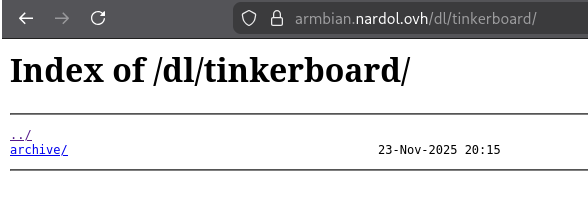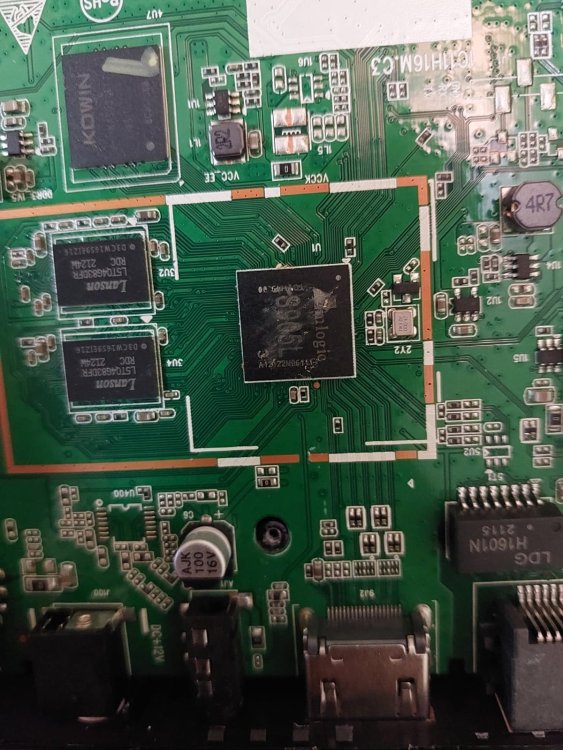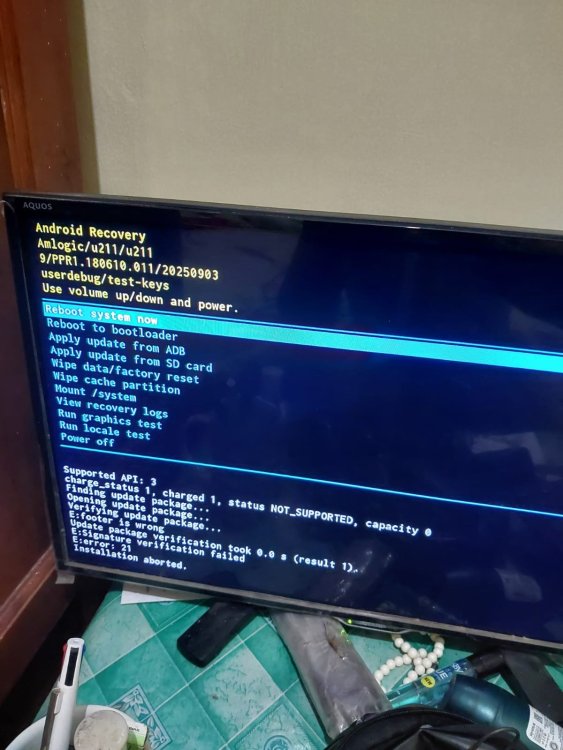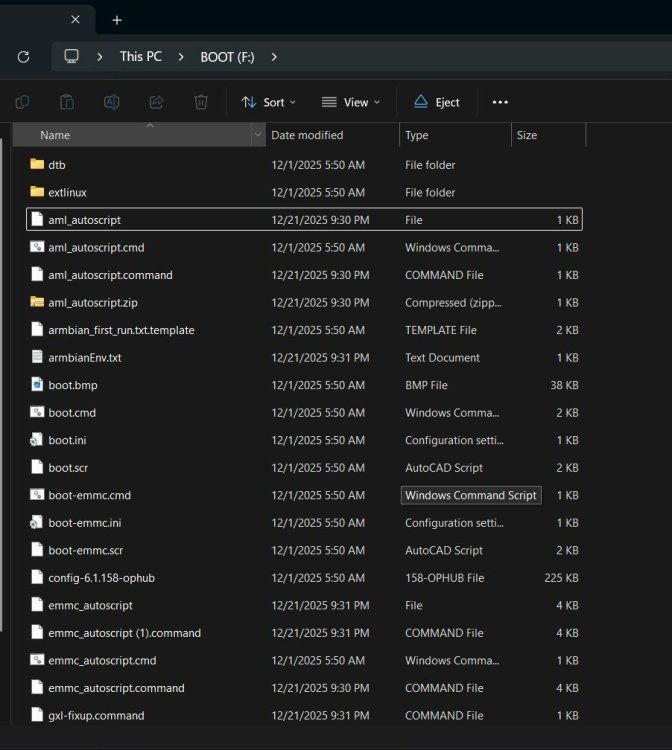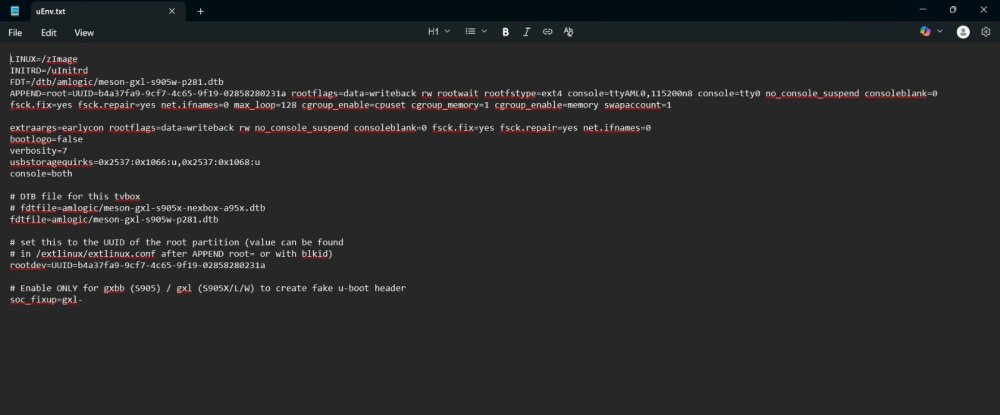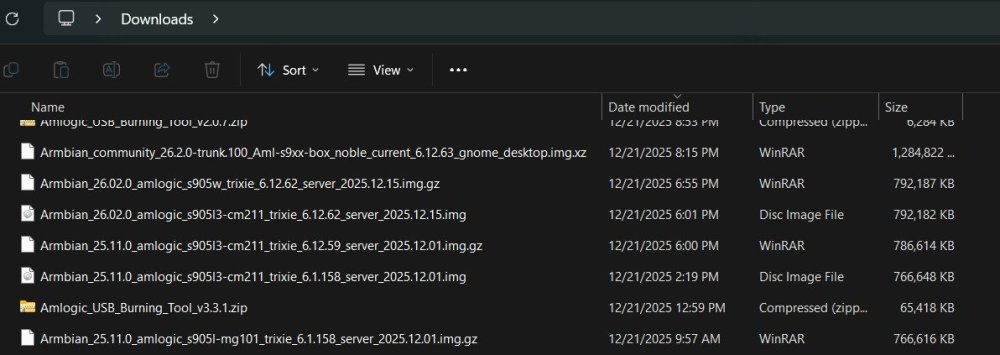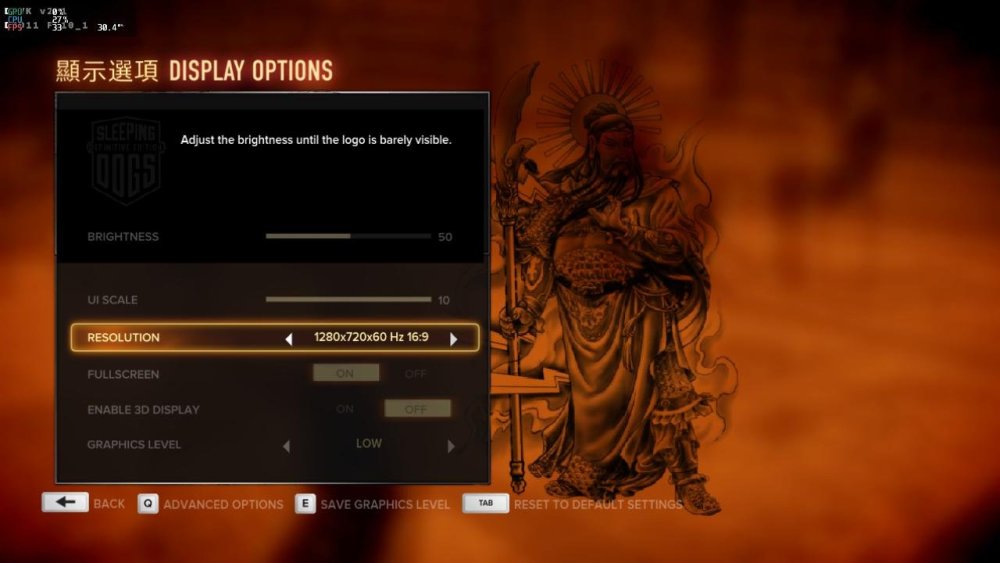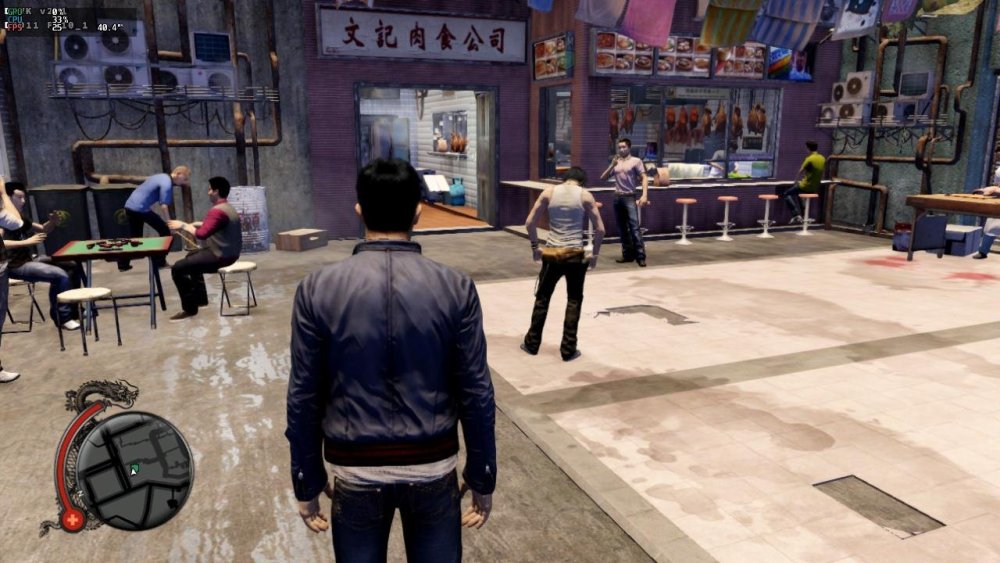All Activity
- Yesterday
-
yeah, this is quite helpful, although the best solution is to wait at least until 6.19. But now I can see that the board was not abandoned, which I was a bit worried about. It seems to be a nice entry-level option and compatibility of both boards with rpi5 HATs due to the exposed PCIe is a great feature. I found the A53 cores quite speedy on Rock 2F and also not to produce much heat. That's why I might have been a bit impatient (I want to be able to use the pcie with mainline fixes).
-
Hey! Got it up and running - I have an Armbian SD card image based on the source trees found on https://github.com/orangepi-xunlong. Since I am a newbie to Armbian, please accept my apologies for beginner errors. Here's what I currently got on my UART: root@orangepirv2:~# uname -a Linux orangepirv2 6.6.63-current-ky #1 SMP PREEMPT Tue Mar 18 02:29:27 UTC 2025 riscv64 GNU/Linux root@orangepirv2:~# cat /etc/os-release PRETTY_NAME="Armbian-unofficial 26.02.0-trunk trixie" NAME="Debian GNU/Linux" VERSION_ID="13" VERSION="13 (trixie)" VERSION_CODENAME=trixie DEBIAN_VERSION_FULL=13.2 ID=debian HOME_URL="https://www.armbian.com/" SUPPORT_URL="https://forum.armbian.com" BUG_REPORT_URL="https://www.armbian.com/bugs" ARMBIAN_PRETTY_NAME="Armbian-unofficial 26.02.0-trunk trixie" This is not ready for prime time now. Needs a bit cleanup b/c I pulled in binaries and private project stuff not meant for armbian-build. Currently resides in this fork https://github.com/sven-ola/armbian-build/tree/orangepi-rv2. If you want to give it a try: it's compile.sh opirv2 after checkout. I've also managed to boot from the top 2230 M.2 SSD but this is also handmade (I'm pretty sure there is a script in here that copies the SD card boot blobs to SPI flash, will try before doing the MR). Best // Sven-Ola
-
I tried to build you an unsupported image using the uBoot config from rock-5b, but unfortunately the build failed. I will spend a bit of time trying to get it to build, but that is about the limit of what I can do because I don't have an NVME hat or a SPI flash module or the lite version of the radxa rock 5c or experience with the SPI subsystem. The rock-5b SPI uBoot compile config suggested by Werner is for the mainline uBoot and it didn't work with the uBoot on rock-5c using spl-blobs although I thought it might. The NVME hat may not have the same device tree overlay as the built in NVME on the rock-5a. There is no reason to believe that the rock-5a-spi-nor-flash device tree overlay for the rock-5a will work correctly for the rock-5c. However you seem to indicate that the SPI module and NVME is working/accessible using the vendor kernel. This does not mean that they will work with uBoot. This may be relevant https://forum.armbian.com/topic/47090-radxa-rock5c-pentahat-and-emmc Building Armbian yourself is pretty easy if you want to experiment with current and edge mainline kernels. https://docs.armbian.com/Developer-Guide_Overview/
-

Efforts to develop firmware for H96 MAX V56 RK3566 4G/32G
GBEM replied to Hqnicolas's topic in Rockchip CPU Boxes
Hello, fellow H96 musers. I've just acquired a 4G/32G H96 Max V56, and tried to flash an image that works on an earlier 8G/64G H96 Max V56, using the appropriate 4G booloader rather than the one I used for the 8G. The HAOS image boots fine, but everything about the Ethernet and WiFi must be wrong, as I have no networking hardware configured. I'm curious to know if there are differences between the 4G/32G board and the 8G/64G, other than eMMC size, that might account for the above outcome? There was some early mention of 'type 1' and 'type 2' 4G/32G boards early on in this thread. Could I be using an inappropriate device tree source configuration for my 4G/32G board? If that's not it, then the only other thing I can think of, is that the 4G/32G board I recently acquired has different WiFi/Bluetooth and Ethernet chips fitted, and the drivers from my 8G/64G build aren't suited? 8G/64G H96 Max V56 PCB: LP6E27116A0 Wifi/BT: HC16335, S3144335 Ethernet: Realtek, RTL8211 4G/32G H96 Max V56 PCB: LS6E28533A0 Wifi/BT: SKI.WB800D80S.1_D40, 2023AP20230(M) Ethernet: Maxio, MAE0621A-02C Thoughts, board type clarification, or driver suggestions, anyone? GBEM 👽 p.s. If anyone has the stock rom for this box I'd be entirely grateful. Through absent mindedness, I foolishly didn't preserve mine. -
In fact, image boot very well with minimal change. (dtb change and something about virtual console) It' s after 🥲
-
They are not empty. You need to go one level deeper: https://armbian.nardol.ovh/dl/tinkerboard/archive/ BTW, try https://github.com/armbian/imager It will be much easier.
-
I though some older images worked ... here you are on your own. Compare device tree from cubox and this hardware and repeate this on modern kernel, and apply difference. Just an idea. Sadly, no simple solution such as download and play.
-
https://fi.mirror.armbian.de/archive/tinkerboard/archive/
-
Hi Igor, Thanks for the link But i think I have already tried all proposed kernels without any luck so far. There is no error in logs, just it doesn't work at all. Interface doesn't bring up with or without dhcp.
-
If you need older images for cubox-i, archive and oldarchieve at https://fi.mirror.armbian.de/
-
Hello, Using the last image for cubox-i (bookworn) , I m unable to get an access to internet using the default interface. eth0 is détected but non functionnal, no eth1 card and no wifi card detected This is a known problem : Does someone has a recent kernel for this device ? I've an old defconfig for kernel 5.2.1 that works (eth0 , eth1 and wifi too) I'm slowly using this defconfig to build a more recent one (5.4.302 is ok but EOL...) Many thanks
-
-
3b is not a supported board, therefore mirror does not have up-to-date images. Check 2nd link I provided
-
Hi All, It seems like all boards are missing current images, at least on the mirrors I checked.... @Werner even in the links you are mentioning, only the archive folder has older images.
-
Well, I finally used some disk drives to move the btrfs data live, repartition with GPT using a vFAT and btrfs partition with 16MB offset of u-boot before the first partition, so with this boots automatically, and I guess more mainline. Thanks @eselarm for your comments, I'll these variables later.
-
This is NOT a support request, more of a brag. Needing a backup system, I was enamored of the low power requirements to run the bpi-m5. But they have no sata ports to drive bigger SSD's. But I bought a 5 stack of 4Tb TMSC built SSD drives at $200/copy, figuring on using a USB3.2 hub and startech's usb3.2 to sata adaptors, a big drive cage and a 50 watt 5 volt psu. More than 3 drives plugged in was too much current for the hub, itgot hot & shut down, so I bought another hub & glued it to the otherside of the drive cage. Problem solved. Printed the shelves to hold the drives and a BPI-m5. I configured the 5 SSD's into a software raid6 of 11TB. A friend that is really good at shell scripts knocked up an rsync based thing that could go thru the user trees of all my machines, currently itself, this box, and all my cnc stuff in the garage, several 3d printers, a total of 8 machines, soon to be 9, making a backup of /home/gene or /home/cnc since cnc is first user on the pi running my big but old Sheldon lathe. This draws around 15 watts idling, up to 19 watts running, and does it all in 28 or 29 minutes. So that is something else these pi clones can do, and do very well. I've run it 7 or 8 times in two weeks, adding another 3d printer to the $systems list each time. Its used 4% of the 11TB so far. Using rsync the only expansion in storage is the backup copy of any file thats been changed since the last run. I love doing odd stuff like this just to see if it can be done. And it has succeeded beyond my expectations. That rpi4b running that lathe was another such "project". Started with an rpi3b which wasn't quite fast enough but its been running for over a decade, almost a decade since I switched it to a rpi4b. There, when the lathe is off, linuxcnc controls that too, the pi and monitor show as a 23 watt load. Whats not to like?
-
I had an error when installing armbian on my M96H androidtv S950L3. Anyone any idea to resolve this?
-
The holes are visible in the 4. Image of fedes_gl's first message. The holes are right to the display. The pins are connected to the AIP1628. This images are from the first layout version. I now have a second Board with V1.4 marked in the Layout. The holes are no longer present in this version. It has also has a different Wi-Fi chip, therefore Wi-Fi doesn't work in my current Armbian release with this v 1.4. box.
-
Hello! I've built my own sbc using the Allwinner H3 chip, and I'm looking to get a custom armbian image running on it. I've already successfully compiled an image by adding a new config to u-boot and armbian-build, and a device tree to the linux kernel. Now I'm looking to get the WiFi working, but I can't seem to find where I can change its pin definitions. I'm using the AP6212: the SDIO pins are connected to SDC1 (aka mmc1) like every other board, but the WL_REG_ON (aka WL-PMU-EN) and WL_HOST_WAKE (aka WL-WAKE-AP) pins are connected to GPIO pins different from all other boards, so I'll need to change their pin assignments in the kernel manually. But I can't find where are these pins defined! Do I need to change it via u-boot, the kernel, a module or some config file? Any pointers would be appreciated! Thanks in advance
-
There seems to an issue with some boards not showing download links. Until fixed feel free to dig through both mirror and community images: https://fi.mirror.armbian.de/archive/ https://github.com/armbian/community/releases
-
I can't access the download links on the Armbian website; they appear blank and no downloads are available. Please help.
-
bringing up a BIG 3d printer from square one on a bpi--m5 with a fairly new image. The pager requires 10 or more mouse clicks, starting with the _ . . . . . at the upper left corner of what I think is the default xfce4 screen. All the eye candy and mouse clicks to actually switch workspaces are very distracting when one is trying to configure klipper. Can all this be reduced to a single click on the dot representing that workspace in the micro-pager? The eye candy is impressive to visiting frogs, until its a PITA when actually doing work. We buy these things in 6 pack qty's to do work, and give you a small monthly support, but impressing the frogs is maybe .0000002% of the time spent as I don't invite the frogs in to see my printer farm very often.
-
@schwar3kat Thanks!
-
I will take a look, but I have no experience with SPI on this board. I may have to try some copy pasta.
-

Gaming experience with Orange Pi 5 (RK3588) on Armbian
KhanhDTP replied to KhanhDTP's topic in Orange Pi 5
Armbian 25.11.2 Noble XFCE (BSD Kernel: 6.1.115) + PanVk - mesa 26.0 (https://launchpad.net/~ernstp/+archive/ubuntu/mesaaco) + box64 3.9 (https://ryanfortner.github.io/box64-debs/) + wine-10.14-staging-tkg-ntsync-amd64-wow64 (https://github.com/Kron4ek/Wine-Builds/releases/tag/10.14) + Dxvk 2.1 (stripped) ~24fps@720p Sleeping Dogs - Definitive Edition








